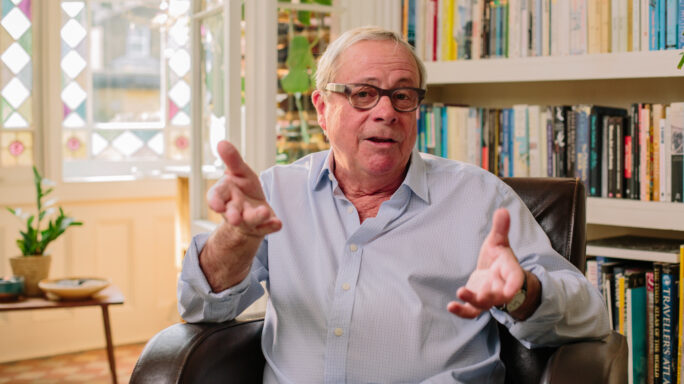Season 2: Unlocking productivity
Unlocking productivity through mental discipline

Google “productivity.” I’ll wait.
Yep, that’s 1.4 billion hits (that’s a billion with a “B”).
Unless you’ve been hiding under a rock for most of your life, you’ve likely felt the push to always be more productive, to do more in less time, and to be more efficient and concise.
Whether it’s “publish or perish,” “photos or it didn’t happen,” or “deliver or disappear,” our work language is filled with phrases that instil fear of not getting enough stuff done, not enough of the right stuff, not quickly enough.
Suppose we dig a bit into the roots of this quintessentially American obsession. In that case, we stumble upon the work of management thinkers like Peter Drucker, economists like Dale Jorgenson and Paul Krugman and industrialists like Henry Ford, with his pioneering assembly line approach. But the origin of the dreaded “to-do list” and the “block schedule” may actually lie with the man, the myth himself, Benjamin Franklin. The waters clearly run deep. More than just the high-level principles of productivity underpinning our work, there are seemingly a million different apps designed to help us get more done quickly and efficiently.
Project management apps, task management apps, time management apps, to-do list apps, storage apps, email apps, integrations, habit apps, habit tracking apps, and mindfulness apps. It’s beyond overwhelming. But as with most things that annoy and stress us, it’s not a lack of tools or strategies that’s the real problem. It’s not even a question of who has more to do or more at stake.
The main issue with productivity is three-fold.
Yuri kruman
Firstly, we never question what is considered “productive” by whom and precisely why. The busiest work is intended to look productive with little to no thought about purpose, strategy or who’s the best person to do certain kinds of work. Many meetings and project management updates have no clear purpose or result. Managers often don’t consider that what takes one person hours can take another minutes, and vice versa.
The second issue is that our approach is always additive, meaning we focus on what app, tool, or approach we need to add to our routine that’s missing. Tools on their own are neutral, whereas the overarching strategy is often missing.
Thirdly, we’re trained to view productivity as an extension of our willpower, of the “grind and hustle” culture that pervades business, as a measure of mental strength and iron discipline. In short, when it comes to the subject of productivity in pop culture (and of course, how to increase it), we’re often asking all the wrong questions.
Let me explain
What if we viewed productivity as an emergent property of doing the right work well rather than good work as an emergent property of productivity? For example, John regularly does work he loves and he’s amazing at doing, which adds massive value to his firm and clients. We can fairly well conclude that John is quite productive, but not arbitrarily so, because he mostly works in his “Zone of Genius,” his work naturally leads him into a state of flow, wherein he can quickly accomplish high-quality work because he’s highly trained and experienced in it, plus loves it.
By contrast, Bob just started a new job in a new industry with no experience and limited knowledge. He’s given basic work without adequate training, thus adding little value at first. Not only is he not valued, but he is also not productive.
Little surprise then that John can be highly productive with or without apps or extra mindfulness, even as Bob spends much of his day running in circles, forced to track his progress on 2 platforms while Slacking and emailing his teammates all day.
It’s time to rethink what is truly productive and why. It’s time to go back to basics. Productivity isn’t some magic trick reserved for brilliant and well-to-do people who can hire help. It’s a function of knowing who you are, where you’re going and practising the habits and worldview that will get you there.
Let’s go deeper
Two core elements of productive life are:
- Reducing the cognitive load from decisions
- Aligning the work you do with who you are.
Under the rubric of reducing cognitive load, setting boundaries with yourself and others is the most basic habit. That means setting (and enforcing) clear red lines of what’s acceptable and not around communication, tasks, compensation, etc.
Next – and this will come as no shocker — doing fewer tasks you hate and more work you love leads to higher productivity. In essence, you can’t “app” or manage the procrastination that your brain inflicts as a coping mechanism when you hate the work you do. Beyond that, one hyper-effective way of lowering the cognitive load is leading a well-organized life with a predictable routine.
Taking good and regular care of your physical and mental health proactively through exercise and passively through intentional rest and relaxation helps recovery and alignment. Reducing financial stress through multiple income streams, living below one’s means, paying off high-interest debt and saving and investing in various asset classes will help you worry about money less and live more fully.
Blocking off regular time on your calendar for deep, aligned work helps block constant distractions and creates momentum. Pruning and fixing your relationships to exclude needless drama and energy loss goes a long way to help you clear your mind and focus.
Getting clear on who you are and where you’re going in life (and with whom) is a huge help for prioritization and focus. Lastly, gratitude for both the good and the bad in life boosts mood, motivation and focus on the positive. Once you’ve got these parts of your life set up, apps, tips, and tricks will improve your productivity further, but from a higher foundation.
Less is indeed more, especially when it comes to productivity.





Leave a comment